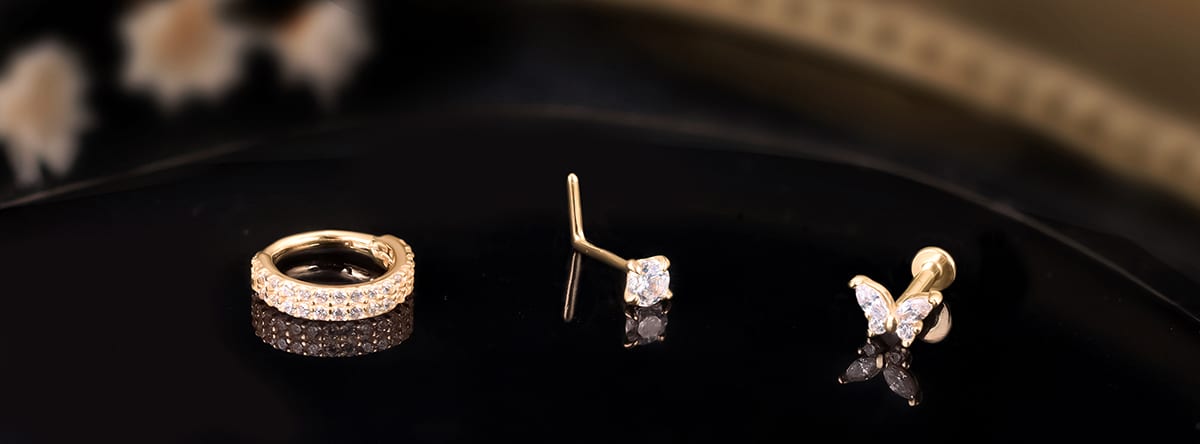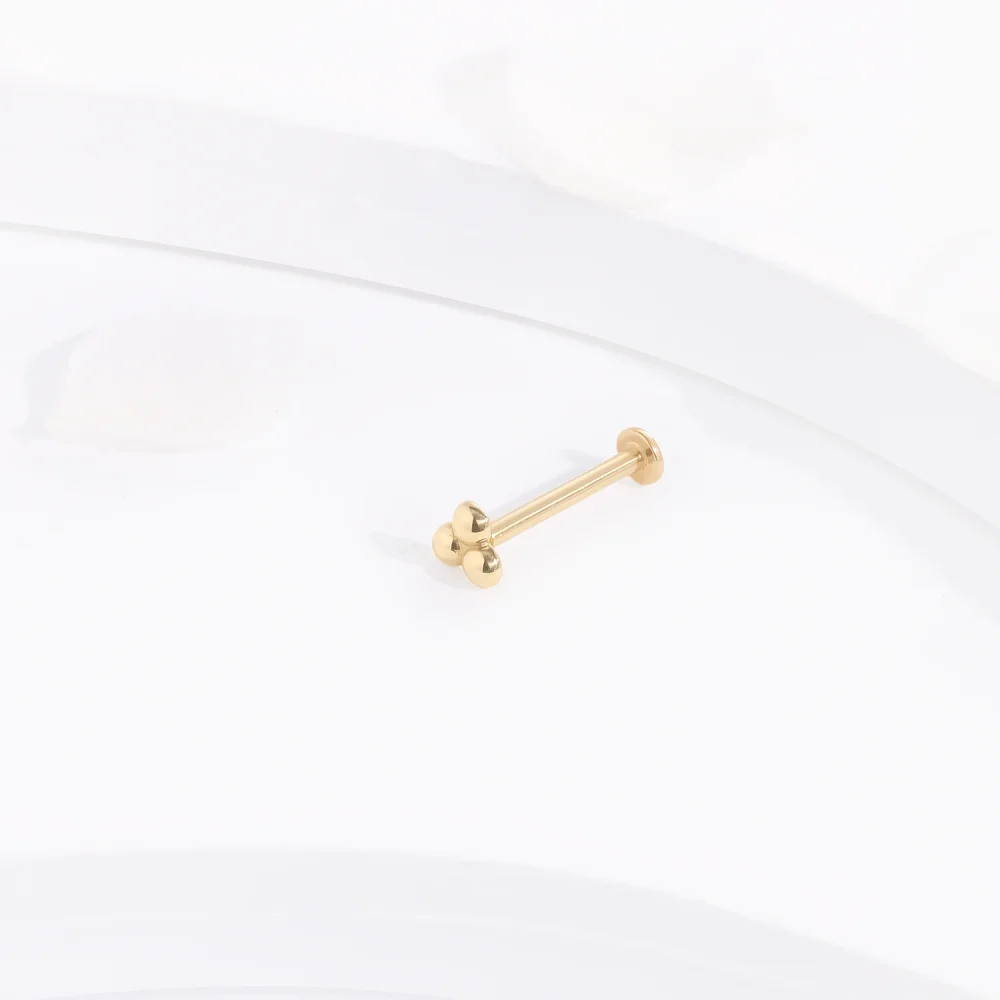이메일:wholesale@goldpiercingfactory.com WhatsApp:+14086905740


Piercing sizes as measured in the factory need to be measured with tools and techniques that make it possible to achieve consistency and quality. The most consistent option is by using a caliper. The most factual ways can be the implementation of a caliper, creating jewellery reading in depth, observing caliper sizes, if it be in millimeters or inches.
Precise measurements help components to fit together seamlessly, which minimizes the chances of production delays and waste of material. For example, any dissimilarity in the width of the degree can result in the end user experiencing discomfort or not replacing the item at all. This is especially true for premium items, including 14K solid gold piercing jewelry purposefully crafted with great detail to fulfill consumer standards.
There are types of piercing sizes that are used in numerous and quality product operations, as they relate to type and user relief. Few products offer beauty alongside a comfortable fit through accurate sizing combined with the design. These types of products showcase how precision impacts design and function.
Moreover, standardized piercing sizes facilitate compatibility across various components, making it easier for consumers to interchange or upgrade their accessories without complications.
An internationally known size for measuring piercings is that of a gauge. Instead of diameter, it uses thickness to categorize piercings. It defines piercings according to how thick they are, instead of how wide they are, creating a standardized system that makes sure there’s consistent uniformity regardless of manufacturer or region.
Complying with these standards is obligatory to maintain compatibility as well as regulatory compliance. For instance, genuine 14K solid gold labret studs are products that adhere to and follow these norms up offering a durable yet stylish option designed to a specific gauge size. Be sure to observe these requirements by supplying lasting but trendy labret studs primarily based on the gauge sizes needed.
However, there are some systematic ways to take accurate measurements for piercing type sizes that actually leave no room for confusion. Utilize instruments like calipers or micrometers to measure the piercing adequately. Then, you compare the measurement with gauge charts to find the correct size.
So, some of them will choose to have a pin measuring on their own, especially those designs that we call threadless designs, such as the ones that we found from the best premium body jewelry collection. This allows the end product to be exactly what the consumer wants while remaining structurally sound.
However, scaling measurement processes presents its challenges, such as human error and equipment limitations. Disparate methods or archaic technologies can lead to errors that affect product quality. In addition to this, any variation in raw materials sometimes causes process variation from lot to lot.
These problems are expected in lower quality materials, but extremely high-end materials such as 14K gold require precision not just in the appearance but also in the cutting and maintaining its hypoallergenic properties and durability.

To address these challenges, invest in advanced measuring equipment capable of delivering consistent results across large volumes. Implementing automated systems can minimize human error while improving efficiency. Regular calibration of tools ensures accuracy over time, further enhancing reliability.
Instilling an environment of constant progression helps your team innovate and adopt modern approaches. This allows you to deal with all the challenges that are involved when scaling up operations through training and always being on top of technological developments in your field.
Automatic systems have converted the measurement of piercing sizes in industry. Automation reduces the room for human error, increases consistency and speeds up the production rate. For example, one of the many unique technologies used, such as super-accurate robotic arms that come with precision sensors, is capable of measuring piercing sizes to the micrometer, giving them unmatched accuracy.
Automation will provide real-time data collection and analysis of processes, allowing manufacturers to detect inaccuracies in real time. It helps save material and increases overall efficiency by allowing for aspiration before human interaction of the days delivered on the factory-floor.
Aside from this, there were advancements in sensor technology that are used for accurate measurements. Consider high-resolution optical sensors, for instance, which work at distances and can perceive very small changes in size and form. This is especially helpful when measuring intricate components with a high threadless jewelry design content, as each aspect must be measured meticulously.
Moreover, they measure by physical interaction with the material surface with the use of tactile sensors. That means that even if you are measuring non-standard shapes or materials, you can still count on effective readings. The use of these state of the art sensors in the manufacturing workflow ensures that every product is to the standard needed.
Perform maintenance regularly to avoid inaccurate or broken measuring equipment. Calipers and other similar tools – like micrometers – can lose their calibration after use. They are checked and recalibrated routinely, ensuring a higher accuracy and fewer errors during the production process.
Software updates are just as important for automated systems to help enhance abilities while fixing any possible bugs as well. This not only enhances the accuracy of your measurement but also is a good way to keep your equipment running for a longer time.
Somewhere else, the company also needs to invest in employee training, which is also one of the cornerstones of effective measurement practices. Workers must be adept at operating sophisticated tools and using data to read them.
GPF features a one-of-a-kind collection of premium-quality piercing jewelry with impressive craftsmanship. With light reflecting in every direction from the cubic zirconia that comprises these sophisticated clusters, products exemplify glamour. These items are not only beautiful, but have some great design features, like the threadless steel pins that will keep them secured to your ear.
Each product combines timeless design with modern engineering, making them ideal for consumers who value both aesthetics and comfort.
GPF is known for its customization, which means that you can customize the products according to specific tastes or needs. These are from simple changes such as alterations to the size of your needs to more unique products like the GU70G labret stud featuring a chunky half sphere top. They are suitable for all tastes but still maintain a high level of quality.
Q1: What role in piercing size measurements does automation play?
A: Automated systems lessen errors in human intervention, providing you with more accuracy alongside more consistent results, combined with real-time data analysis leading to improved efficiency in the manufacturing processes.
Q2: What importance do sensors hold in the context of measurement?
A: Advanced sensors, including optical devices with high resolution, detect small variations in size and shape to ensure highly accurate measurements of sophisticated designs.
Q3: Why should you train the employees to maintain measurement accuracy?
A: Workers need to be trained for advanced tools, including data interpretation, to keep the quality consistent across production lines.